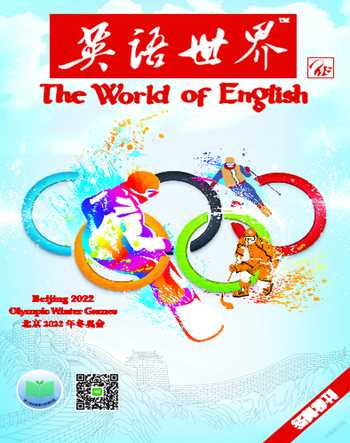Li Yan, from Short Track Speed Skater to Head Coach 李琰:从短道速滑运动员到主教练
王越凡
Head coach Li Yan bursts into tears of joy when she sees 18 year-old Zhou Yang first cross the finish line at the women’s 1,500m short track speed skating final at the 2010 Winter Olympic Games in Vancouver on February 20.
[2] “It is an historical breakthrough and a great triumph,” Li spoke of Zhou’s success highly.
Li made a proactive1 and risky strategy for Zhou’s competition in the final race. “It was the last chance to go all out2 and fight. We have to take the risk. Any other way she wouldn’t have the opportunity to win.” Li explained.
[3] Zhou, silver medalist in the 2009 world championships, sped up to pass rivals Lee Eun-byul of South Korea and Lee’s compatriot Park Seung-hi with three laps left and didn’t let them skate near her until she crossed the finish line.
“She shifted her position frequently during the final competition. Few people do that because it will easily exhaust an athlete during a 1,500m speed skating race; however, she has the guts to3 do this. She is a gentle girl in daily life, but a really brave fighter during the games.” Li added.
[4] Li Yan was also excited when Turin Olympic champion Wang Meng maintained the women’s 500 meter short track speed skating title on February 17th at the Vancouver Winter Games.
[5] After winning the final race, Wang Meng gave Li a tight hug and then kneeled down to bow down two times to her leaders, coaches and teammates. “One is to thank my head coach Li Yan, who teaches me how to skate, and the other one is to thank my leaders and teammates.” said Wang Meng.
“I know it is her way to express her appreciation to me and I feel very grateful.” Li smiled, “We trust and support each other during daily training and we have a tacit4 understanding.”
[6] Li Yan was born in northeast China’s Heilongjiang Province known as the home of ice and snow sports in China. She entered sports school to receive standard training at age 12 and was sent to a local professional team for her excellent performance several years later.
[7] However, an accident during a competition in 1984 almost ruined her career in sports. Her left knee was badly injured when she hit the board surrounding the rink. It was such a miracle that she recovered from the injury and returned to the skating rink a year later and in 1987 she joined the National team.
[8] At the 1988 Calgary Olympic Winter Games when short track speed skating was still a demonstration event, 20 year-old Li Yan won a gold medal and two bronze medals in women’s 1,000m, 1,500m and 500m speed skating and refreshed the world record in women’s 1,000m and 1,500m speed skating.
[9] Short track speed skating became an official event at the 1992 Albertville Winter Olympics. Li claimed a silver medal at the women’s 500m short track speed skating final during that Winter Olympics. It was China’s first Olympic medal in short track speed skating.
[10] Li also made a qualified coach after her retirement. She served as the exchange coach for the Slovakian team in 2001 and the team ranked second in Europe half a year later.
[11] She began coaching the American team in 2003. In the 2006 Turin Winter Olympics, American athlete Apolo Anton Ohno beat South Korean rival Ahn Hyun-Soo, winning the men’s 500m short track speed skating gold medal, which was America’s first and only Olympic gold medal in short track speed skating.
[12] After returning to China, she became head coach of the Chinese short track speed skating team and assisted Chinese athletes in making great achievements at the Asian Winter Games and World Championships.
[13] In 2006, she signed a four-year contract to coach the Chinese national short track speed skating team. Under her supervision, the talented but temperamental Wang Meng obtained great improvement by breaking the world record of 500m repeatedly. Moreover, a young star in Zhou Yang was fostered and dominated the fields of 1,000m and 1,500m of women short track speed skating during the time of 2008 to 2010. At the 2010 Winter Olympics in Vancouver, the Chinese women’s team completed an unprecedented sweep of all four short track speed skating events at the Olympics. The four gold medals her team won made Li the most decorated Chinese coach in one Olympic game.
[14] In 2010 and 2014 Winter Olympic Games, her team won 6 gold, 3 silver and 1 bronze medals in total. In May 16, 2014, a press release provided by the Chinese Skating Association announced that “Li would remain as the head coach of the Chinese short track team until the Pyeongchang Games”.
[15] On June 2, 2017, Li Yan was elected chairman of the Chinese Skating Association.
2010年2月20日,溫哥华冬季奥运会短道速滑女子1500米决赛,主教练李琰见证18岁的周洋率先冲过终点线,不禁喜极而泣。
[2]“这是一次历史性的突破,也是一场伟大的胜利。”李琰高度赞扬了周洋的夺冠。
李琰为周洋的决赛制订了一种主动而冒险的战术。“这是最后一次全力冲击的机会。我们必须冒险。采取任何其他方式,她都不可能有机会取胜。”李琰解释说。
[3]周洋,2009年世界锦标赛亚军,在最后三圈加速,超过韩国对手李恩星和朴升智,并将她们远远甩在身后,直到滑过终点线。
“她在决赛中频繁改变位置。几乎没有人会这么做,因为在1500米的速滑比赛中,这很容易让运动员精疲力竭;但她有勇气这么做。在生活中,她是一个温和的女孩,但在赛场上,她是一名真正的勇士。”李补充道。
[4]同样使李琰激动万分的是,2月17日,都灵冬奥会冠军王濛蝉联了温哥华冬奥会短道速滑女子500米的冠军。
[5] 决赛夺冠后,王濛紧紧拥抱了李琰,继而向领导、教练和队友跪地叩首两次。“一次是感谢我的主教练李琰,是她让我知道了该怎么滑冰;另一次是感谢我的领导和队友。”王濛说。
“我知道这是她向我表达感谢的方式,我感到非常荣幸。”李琰微笑道,“我们在日常训练中彼此信任,相互支持,有着心照不宣的默契。”
[6]李琰出生于中国东北部的黑龙江省,这座城市以中国的冰雪运动之乡而著称。她12岁进入体校接受正规训练,几年后因表现出色入选当地的专业队。
[7]然而,1984年一场比赛中的意外差点断送了她的体育生涯。她的左膝撞到冰场周围的挡板而严重受损。可以说这是一个奇迹——她从伤病中恢復,一年后重返滑冰场,并于1987年加入国家队。
[8] 1988年卡尔加里冬奥会上,短道速滑还只是一个表演项目,20岁的李琰在女子短道速滑1000米比赛中摘取了金牌,在1500米和500米比赛中获得铜牌,并刷新了女子1000米和1500米的世界纪录。
[9] 1992年阿尔贝维尔冬奥会上,短道速滑成为了正式比赛项目。李琰在这届冬奥会女子短道速滑500米决赛中斩获一枚银牌。这是中国短道速滑项目的第一枚奥运奖牌。
[10]退役后,李琰成为了一名优秀的教练。2001年,她以交换教练的身份训练斯洛伐克队,使这支队伍在半年后位列欧洲第二。
[11] 2003年,她开始训练美国队。2006年的都灵冬奥会,美国选手阿波罗·安东·奥赫诺战胜韩国对手安贤洙,拿下了男子短道速滑500米的金牌,这是美国在短道速滑项目中取得的第一枚也是迄今唯一一枚奥运金牌。
[12]回到中国后,她成为了中国短道速滑队的主教练,帮助中国运动员在亚洲冬季运动会和世界锦标赛上取得了巨大成就。
[13] 2006年,她签下了一份为期四年的合同,训练中国国家短道速滑队。在她的指导下,天赋异禀但性格冲动的王濛进步飞速,屡次打破500米世界纪录。此外,2008年至2010年间,新秀周洋日渐崛起,在女子短道速滑1000米和1500米竞技中独领风骚。2010年的温哥华冬奥会,中国女队在奥运会上史无前例地包揽了短道速滑全部四项的冠军。李琰的队伍斩获的四枚金牌使她成为了一届奥运会收获奖牌最多的中国教练。
[14]在2010年和2014年两届冬奥会上,她的队伍共获得6金、3银、1铜。2014年5月16日,中国滑冰协会在新闻发布会上宣布,“李琰将继续担任中国短道速滑队主教练,带队参加平昌冬奥会”。
[15] 2017年6月2日,李琰当选为中国滑冰协会主席。
(译者单位:复旦大学奇境译坊)

